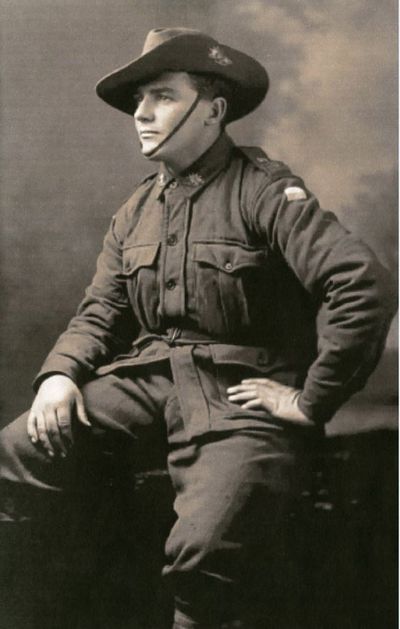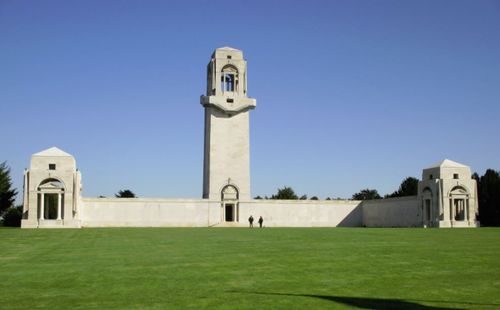Difference between revisions of "Stanley Joseph Callow Champion"
From Our Contribution
| Line 72: | Line 72: | ||
==War Service== | ==War Service== | ||
| − | After a month of introductory training, Stan was earmarked for the 7th reinforcement draft for the 11th Battalion, but after only four days with them he was transferred to the 6th reinforcement draft for the 12th Battalion. Initially transported to Port Suez, following minimal further training he was shipped to Anzac Cove where he was taken on strength by the 12th Battalion on the Gallipoli Peninsula on 6 Aug 1915. | + | After a month of introductory training, Stan was earmarked for the 7th reinforcement draft for the 11th Battalion, but after only four days with them he was transferred to the 6th reinforcement draft for the 12th Battalion. Initially transported to Port Tewfik (Suez), following minimal further training he was shipped to Anzac Cove where he was taken on strength by the [[12th Battalion]] on the Gallipoli Peninsula on 6 Aug 1915. |
| − | Three days later he attended 2nd Field Ambulance with an abscess maxilla which required treatment by the [[1st Australian Casualty Clearing Station]] before evacuation to Lemnos Island the same day. he was admitted to the 24th Casualty Clearing Station on 15 Aug 1915, and on 10 Sep 1915 he was admitted to the [[1st Australian Stationary Hospital]] at Mudross before being transferred to [[HMHS Aquitania]] on 18 Oct 1915. | + | Three days later he attended [[2nd Field Ambulance]] with an abscess maxilla which required treatment by the [[1st Australian Casualty Clearing Station]] before evacuation to Lemnos Island the same day. There, he was admitted to the 24th Casualty Clearing Station on 15 Aug 1915, and on 10 Sep 1915 he was admitted to the [[1st Australian Stationary Hospital]] at Mudross before being transferred to England via embarkation on [[HMHS Aquitania]] on 18 Oct 1915. Departing on 21 Oct 1915, he was admitted to the 2nd Southern General Hospital in Bristol with dysentery six days later. |
Arriving back in Egypt on 14 Feb 1916, he rejoined the 12th Battalion at Serapeum on 11 Mar 1916, just in time to proceed to Alexandria, where just over a fortnight later, on the 29 Mar 1916 he boarded the [[HMT Corsican]] with the rest of his battalion. | Arriving back in Egypt on 14 Feb 1916, he rejoined the 12th Battalion at Serapeum on 11 Mar 1916, just in time to proceed to Alexandria, where just over a fortnight later, on the 29 Mar 1916 he boarded the [[HMT Corsican]] with the rest of his battalion. | ||
| Line 80: | Line 80: | ||
Arriving in Marseilles, France on 5 May 1916 they entrained for St Omer, and then Strazule, arriving on 8 Apr 1916. Training for the battalion and others occurred at Strazule and Sailly-sur-la-Lys before they began to rotate into the front lines during May 1916. | Arriving in Marseilles, France on 5 May 1916 they entrained for St Omer, and then Strazule, arriving on 8 Apr 1916. Training for the battalion and others occurred at Strazule and Sailly-sur-la-Lys before they began to rotate into the front lines during May 1916. | ||
| − | In July 1916 they moved to the Pozières area and prepared for an attack on the ruins of Pozières. The 12th Battalion was tasked with taking the second line of objectives in the attack. As a member of B Company, Stan was in the first wave of attackers from his battalion to set out to capture Poziéres on the 23rd, and they then moved to a position on the north east edge of the township, before they were again moved to take up a defensive position on the south east edge of the township . 375 casualties were suffered by the 12th Battalion alone on that day. Those who had gained the German's trenches had come under a massive bombardment that continued for many hours. | + | In July 1916 they moved to the Pozières area and prepared for an attack on the ruins of Pozières. The 12th Battalion was tasked with taking the second line of objectives in the attack. As a member of 'B' Company, Stan was in the first wave of attackers from his battalion to set out to capture Poziéres on the 23rd, and they then moved to a position on the north east edge of the township, before they were again moved to take up a defensive position on the south east edge of the township. 375 casualties, including Stanley were suffered by the 12th Battalion alone on that day. Those who had gained the German's trenches had come under a massive bombardment that continued for many hours. |
<div><ul> | <div><ul> | ||
| Line 113: | Line 113: | ||
[[Category:Born Vic]] | [[Category:Born Vic]] | ||
[[Category:1914-15 Star]] | [[Category:1914-15 Star]] | ||
| − | |||
[[Category:1916 KIA]] | [[Category:1916 KIA]] | ||
[[Category:1916 Deaths]] | [[Category:1916 Deaths]] | ||
Revision as of 01:02, 2 March 2021
 Birtwistle Collection | |
| Personal Information | |
|---|---|
| Date of Birth | 8 Aug 1890 |
| Place of Birth | Ballarat, Victoria |
| Death | 25 Jul 1916 |
| Place of Death | Poziéres sector, France |
| Age at Enlistment | 24 years 9 months |
| Description |
5'5¼" (1.66m) tall ; 151 lbs 68.492 kg ; medium complexion ; blue eyes ; dark brown hair |
| Occupation | Orchardist |
| Religion | Methodist |
| Address | Bedfordale, Western Australia |
| Next of Kin | Father , Mr Joseph Henry Champion |
| Military Information | |
| Reg Number | 2161 |
| Date of Enlistment | 5 May 1915 |
| Rank | Private |
| Unit/Formation | 12th Battalion, 6th reinforcement |
| Date of Embarkation | 25 Jun 1915 ‒ 18 Jul 1915 |
| Ship Embarked On | HMAT A62 Wandilla |
| Fate | Killed in Action 25 Jul 1916, Poziéres |
| Monument |
Armadale War Memorial (Bedfordale panel) Bedfordale Roll of Honour Villers-Bretonneux Memorial Armadale and Districts Roll of Honour Australian War Memorial |
| Medals |
1914-15 Star British War Medal Victory Medal |
Pre War
War Service
After a month of introductory training, Stan was earmarked for the 7th reinforcement draft for the 11th Battalion, but after only four days with them he was transferred to the 6th reinforcement draft for the 12th Battalion. Initially transported to Port Tewfik (Suez), following minimal further training he was shipped to Anzac Cove where he was taken on strength by the 12th Battalion on the Gallipoli Peninsula on 6 Aug 1915.
Three days later he attended 2nd Field Ambulance with an abscess maxilla which required treatment by the 1st Australian Casualty Clearing Station before evacuation to Lemnos Island the same day. There, he was admitted to the 24th Casualty Clearing Station on 15 Aug 1915, and on 10 Sep 1915 he was admitted to the 1st Australian Stationary Hospital at Mudross before being transferred to England via embarkation on HMHS Aquitania on 18 Oct 1915. Departing on 21 Oct 1915, he was admitted to the 2nd Southern General Hospital in Bristol with dysentery six days later.
Arriving back in Egypt on 14 Feb 1916, he rejoined the 12th Battalion at Serapeum on 11 Mar 1916, just in time to proceed to Alexandria, where just over a fortnight later, on the 29 Mar 1916 he boarded the HMT Corsican with the rest of his battalion.
Arriving in Marseilles, France on 5 May 1916 they entrained for St Omer, and then Strazule, arriving on 8 Apr 1916. Training for the battalion and others occurred at Strazule and Sailly-sur-la-Lys before they began to rotate into the front lines during May 1916.
In July 1916 they moved to the Pozières area and prepared for an attack on the ruins of Pozières. The 12th Battalion was tasked with taking the second line of objectives in the attack. As a member of 'B' Company, Stan was in the first wave of attackers from his battalion to set out to capture Poziéres on the 23rd, and they then moved to a position on the north east edge of the township, before they were again moved to take up a defensive position on the south east edge of the township. 375 casualties, including Stanley were suffered by the 12th Battalion alone on that day. Those who had gained the German's trenches had come under a massive bombardment that continued for many hours.
"Enlisted 5th May 1915, and sailed with the 6th Reinforcements to the 12th Battalion on 1st August 1915. He served in Gallipoli and took part in the attack on Lone Pine. Fell ill, and was invalided to England. Returned to Egypt and then went on to France."[1]
William Butcher wrote home to say that Stanley was killed by a bullet to the stomach that had glanced off an Officer's helmet at Pozieres. On Sunday August 27th, 1916 a service was held at the Bedfordale Hall in memory of him and Frank Dowell.[2]
Stanley's death was reported in the 199th Casualty List The List was published in the Western Mail on 1 Sep 1916.[3]
CHAMPION (in loving memory of Stanley J. C. Champion (dear old Stan.) who fought through Gallipoli, and in France until he fell at Pozieres, on July 25, 1916. He was good. —Inserted by Pearson and Zoe Mann (who will never forget him.) and Ken.[4]
CHAMPION.-Killed in action in France on July 25, Stanley J. C., loved son of J. H. and Mrs. Champion, Bedfordale brother of Roy (on active service), Eunice, Horton, and Gordon, and Mrs. T. E. Douglas, Albany, aged 26 years.[5]
CHAMPION.-In loving remembrance of Stanley, killed in action July 25, 1916, beloved friend of Eileen Rourke. At rest.[6]
References
- ↑ "The Drill of the Foot-Hills" (PDF) (1917). Western Australia. Mar 1917. p. 8. Retrieved 16 May 2017 – via State Library of Western Australia.
- ↑ "The Drill of the Foot-Hills" (PDF) (1917). Western Australia. Mar 1917. p. 11. Retrieved 16 May 2017 – via State Library of Western Australia.
- ↑ "THE ROLL OF HONOUR.". Western Mail. XXXI, (1,601). Western Australia. 1 September 1916. p. 16. Retrieved 30 May 2017 – via National Library of Australia.
- ↑ "Family Notices". The South-western News. XIV, (705). Western Australia. 27 July 1917. p. 2. Retrieved 30 May 2017 – via National Library of Australia.
- ↑ "Family Notices". Western Mail. XXXI, (1,600). Western Australia. 25 August 1916. p. 30. Retrieved 30 May 2017 – via National Library of Australia.
- ↑ "BEDFORDALE.". Western Mail. XXXI, (1,600). Western Australia. 25 August 1916. p. 18. Retrieved 30 May 2017 – via National Library of Australia.
